Dr Bernard Dionysius Geoghegan explores the pre-history of digital humanities and big data in 20th century experiments around cybernetics, computing, and information theory

In Code: From Information Theory to French Theory, Dr Geoghegan uncovers how questions of human, social, and aesthetic concern figured prominently in early debates over computing. Against a longstanding tendency to treat computing and technological innovation as a problem that imposes itself of culture and society, Dr Geoghegan explores how leading cultural theorists in fields such as literary studies, anthropology, linguistics, and psychiatry helped shape early accounts of computing by the likes of mathematicians Norbert Wiener, Warren Weaver, and Claude E. Shannon.
Along the way, he tells a new story of criticism, cultural theory, so-called French theory—in which cultural theorists' such as Margaret Mead, Gregory Bateson, Claude Lévi-Strauss, Roman Jakobson, Jacques Lacan, Roland Barthes, and Luce Irigaray drew on their experiences in colonies, asylums, and under World War II to decipher how computing and communications technologies could shape the culture and politics of the modern world.
Since my undergraduate study, I'd had this impression of uncanny parallels between certain ways of thinking about "text" and "communication" in seemingly disparate fields like literary theory and computer science. This book gave me a chance to better understand the history of interdisciplinary collaborations that gave rise to some of these shared ideas. I was really astonished to discover how research in seemingly remote fields like colonial ethnography and abnormal psychiatry shaped early ideas in computing, information theory, and cybernetics.– Dr Bernard Geoghegan, Reader in the History and Theory of Digital Media
On 25 and 26 January 2023, the ASU Department of English's program in Film and Media Studies presented a talk where Dr Geoghegan was able to draw on findings from his book and ask the questions "Whither the Human? Computing and Indigenous Knowledge Against the Inhuman Sciences" and 'What are the Human Sciences?' at the subsequent panel discussion.
In his talk and discussion, Geoghegan explored how the "human" at the centre of the humanities seems uncertain and how advances in "big data" and "cultural analytics" chip away at established methods in the humanities. Meanwhile, decolonial and Indigenous studies remind us how exclusionary the humanism orienting the humanities really is. In the following panel session, participants were encouraged to think together about the role of the humanities and define the human sciences, in the context of its use at the Julie Ann Wrigley Global Futures Laboratory and international sustainability sciences and educational platforms. Panellists were also able to explore how emergent research on environments and technology is re-imagining the question of the human in the wake of planetary crisis and ecological precarity.
Geoghegan's visit was sponsored by the ASU Department of English's Film and Media Studies Program, the ASU Center for Philosophical Technologies, the ASU Environmental Humanities Initiative, the Flagship Hub of the UNESCO BRIDGES Sustainability Coalition, the Regional Center of Expertise on Education for Sustainable Development (RCE) Greater Phoenix Area, and the Learning Futures Collaborative on Education, Sustainability and Global Futures as part of the Learning Planet Festival.






